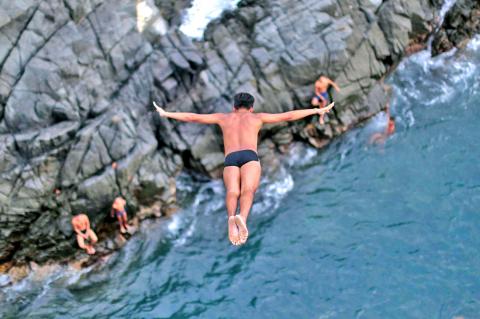Cliff divers in Acapulco say they never forget their first time: the leap into the void, the feeling of flying, the shock of hitting the water at high speed. Across the generations, whole families of divers have earned their living wowing tourists from around the world with the 35m plunge off La Quebrada, the rock face that looms above the Mexican resort city’s Pacific coast.
However, the seemingly fearless daredevils who keep this eight-decade tradition alive now face a new kind of risk: their livelihoods are under threat from a wave of violence sweeping Acapulco and scaring away tourists.
Nearly 500 people have been killed so far this year as drug cartels wage war in the city.

Photo: AFP
The bloodshed has taken a toll on the tourism industry.
A decade ago, 150 cruise ships per year visited Acapulco. Today, the number has fallen to about 10.
That is worrying for the 62 full-time cliff divers who make their living at La Quebrada.
“The tourists need to come back,” said Monico Ramirez, a 62-year-old retired diver whose son and grandson now carry the flame.
The violence does not threaten anyone not caught up in the drug trade, Ramirez insisted.
“It’s mainly a settling of scores,” he said.
Guerrero, the state where Acapulco is located, has had a year of terrible press.
The state made headlines over the shocking disappearance of 43 students in September last year.
Prosecutors say the students were abducted by corrupt police in the city of Iguala, three hours inland from Acapulco, and handed over to a drug gang that killed them and burned their bodies.
Acapulco has had its share of bad publicity, too.
Several mass graves have been found on its outskirts, and the leader of one of the groups searching for the 43 missing students was shot dead just outside the city earlier this month.
The unrest spells bad news for the divers, whose salaries come from the admission fees tourists pay to watch them, plus tips and sales of food, drinks and souvenirs.
The work pays about US$550 per month, according to Ramirez, and comes with health benefits, professional training and one day off per week — a great job in a country where more than 55 million people live in poverty.
It is a job for people comfortable with risk.
As they stand over the abyss, preparing to thread through the rocky outcrops in a three-second free fall, the divers have to time their jump to coincide with an incoming wave, or risk cracking their skulls on the rocky bottom.
The water is just 4m deep. They will hit it at 90kph.
“You have to visualize your dive,” Ramirez’s 43-year-old son, Jorge Ramirez, said.
Divers also face frequent injuries, including detached retinas, ruptured eardrums, broken forearms and neck and back trouble.
“Divers’ sight gets worse over time, like pelicans, which eventually go blind from plunging into the water and end up crashing into the rocks,” Jorge Ramirez said.
“At first I was afraid of the sea, but little by little, I came to like it,” said Jorge Antonio Ramirez, Jorge Ramirez’s 24-year-old son and the latest to carry on the family trade.
In the 80 years that professional divers have been taking the plunge off La Quebrada, not one has been killed, Monico Ramirez said.
“That’s surely thanks to the Virgin of Guadalupe, who watches over us,” he said.
Before each jump, the divers pray to a statue of the Virgin that sits atop the cliff.
The tradition of diving off La Quebrada started with a dare between local fishermen and soon became an iconic tourist attraction.
There is a whiff of nostalgia in the sea spray around the cliffs.
In a small museum, black-and-white photographs depict Acapulco’s glory days, when the likes of former US president John F. Kennedy, Frank Sinatra, Orson Welles and Walt Disney visited La Quebrada to watch the divers.
The cliffs were made famous by Tarzan star Johnny Weissmuller, whose character jumped off them in the 1948 movie Tarzan and the Mermaids.
Elvis Presley’s character did the same in Fun in Acapulco (1963).
However, neither actually made the dives depicted in their movies.
They left the job to local stunt doubles — and Elvis never even set foot in Acapulco.
On the other hand, Weissmuller fell in love with the city.
He and his friend John Wayne bought a hotel perched on the cliffs, which welcomed a stream of Hollywood jet-setters in the 1950s.
Urban legend has it that Weissmuller’s stunt double, Raul Garcia, died filming the jump immortalized in the Tarzan movie.
The myth is true in a way — but 50 years too early.
Garcia, a local celebrity, died in 2004 at the age of 76, after injuring himself while taking one last dive from the cliffs.
For his part, Weissmuller died in 1984 — also in Acapulco. Like his stunt double, he is buried along the city’s Pacific coast.

Robinson Cano spent 17 seasons playing in the MLB in front of all kinds of baseball fans, but he said there is something special about his stint with the Mexican Baseball League’s Diablos Rojos. He is not alone. The league last week opened its 100th season, aiming to keep an impressive growth in attendance that began after the national team’s surprise run at the 2023 World Baseball Classic, and is already surpassing some first-division soccer clubs. After finishing third in the 2023 tournament, many casual fans, some of them soccer enthusiasts disappointed after Mexico were eliminated in the first round in the 2022

Noelvi Marte on Sunday had seven RBIs and hit his first career grand slam with a drive off infielder Jorge Mateo, while Austin Wynn had a career-high six RBIs as the Cincinnati Reds scored their most runs in 26 years in a 24-2 rout of the Baltimore Orioles. Marte finished with five hits, including his eighth-inning homer off Mateo. Wynn hit a three-run homer in the ninth off catcher Gary Sanchez. Cincinnati scored its most runs since a 24-12 win against the Colorado Rockies on May 19, 1999, and finished with 25 hits. Baltimore allowed its most runs since a 30-3 loss to

Arne Slot has denied that Darwin Nunez was dropped from Liverpool’s win against West Ham because of a training-ground row with a member of his coaching staff. The Liverpool head coach on Sunday last week said that Nunez was absent from the 2-1 victory at Anfield, having felt unwell during training the day before, although the striker sat behind the substitutes throughout the game. Speculation has been rife that the Uruguay international, whom Slot criticized for his work rate against Wolves and Aston Villa in February, was left out for disciplinary reasons. Asked on Friday to clarify the situation, Slot said: “He

CUNNINGHAM CONNECTS: In the Eastern Conference, the Pistons snapped their record 15-game playoff losing streak by beating the Knicks to level their series at 1-1 Kawhi Leonard on Monday scored 39 points on 15-of-19 shooting as the Los Angeles Clippers evened their first-round NBA Playoffs series against the Nuggets with a 105-102 win in Denver. “It feels like he didn’t miss a shot,” James Harden said. “His shot-making ability is elite.” Good thing, too, because his teammates were a combined 26 of 66 for a 39 percent clip. “I made shots tonight,” Leonard said. “I just keep playing, try to stay in the zone no matter if I’m making or missing shots.” The fifth-seeded Clippers needed every bit of his brilliance to snatch the homecourt advantage in the series